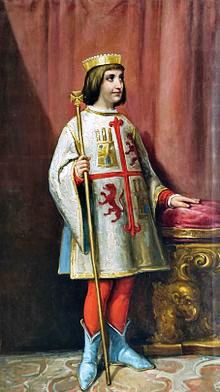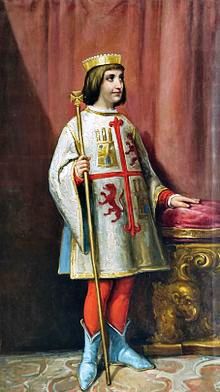Alfonso was the figurehead of rebellion against his half-brother Enrique IV of Castilla (1425-1474).
Alfonso was the only surviving son of Juan II de Castilla, by his second wife, Isabel de Portugal, Enrique IV being the product of his first marriage. Alfonso's sister, the future Queen Isabel I de Castilla, was also the product of this second marriage.
After the death of his father, Juan II, Alfonso, his mother and sister were virtually exiled, his mother to Arévalo and the children to Segovia. When Alfonso was around seven years of age the two children were moved to Enrique's court at Madrid and were placed in Queen Juana's household. During this period it is rumored that Queen Juana, despite being his own cousin through their common Portuguese ancestors, tried to poison Alfonso on at least one occasion, to pave the way for her own daughter to inherit the throne.
In the early 1460s, Castilian nobles became dissatisfied with the rule of King Enrique IV, and believed that the child (Juana, Princess of Asturias) that Enrique's wife Queen Juana had given birth to was not sired by Enrique. Propaganda and rumour encouraged by the league of rebellious nobles argued that her father was Beltrán de la Cueva y Alfonso de Mercado (1443-1492), a royal favorite of low background who had been elevated to enormous power by Enrique and who, by some, has been suggested as Enrique's homosexual lover. This resulted in the name "Juana la Beltraneja", which has stuck with the girl throughout history. If Juana were illegitimate, the next candidate would be Alfonso. If she were legitimate—which is entirely possible—then Alfonso and, ultimately, his famous sister Isabel would both have been usurpers. Considering Isabel's impact on world history, this question has fascinated historians for centuries.
The league of nobles controlling Alfonso forced Enrique with the 1464 Representation of Burgos to repudiate Juana and recognize Alfonso as his official heir. Alfonso then became Prince of Asturias, a title previously held by Juana. Enrique agreed to the compromise with the stipulation that Alfonso someday marry Juana, to ensure that they both would one day receive the crown.
Not long after this, Enrique reneged on his promise and began to support his daughter's claim once more. The nobles in league against him conducted a ceremonial deposition-in-effigy of Henry outside the city of Avila and crowned Alfonso as a rival king. This event is known in history as the Farsa de Ávila/Farce of Avila 5 June 1465. Shortly thereafter, Alfonso began handing out land and titles as if he were already uncontested ruler. A civil war began. The most notable clash was at the Second Battle of Olmedo in 1467, which concluded as a draw.
However, in 1468 at the age of only 14, Alfonso died of a sickness, most likely the plague (although poison and slit throat have been suggested as alternative causes of death). His will left his crown to his sister, Isabel, who was asked to take her brother's place as the champion of the rebels. Shortly thereafter, she declined, and after a negotiation at Toros de Guisando, in which she and her allies received most of what they desired, Enrique was convinced to exclude Juana la Beltraneja from the succession, and to recognize Isabella as his official heir. Though Enrique continued to resist this decision when possible, his actions were ineffective, and he remained at peace with Isabel for the rest of his reign. Isabel became Castile's next monarch when he died in 1474.
Alfonso was the figurehead of rebellion against his half-brother Enrique IV of Castilla (1425-1474).
Alfonso was the only surviving son of Juan II de Castilla, by his second wife, Isabel de Portugal, Enrique IV being the product of his first marriage. Alfonso's sister, the future Queen Isabel I de Castilla, was also the product of this second marriage.
After the death of his father, Juan II, Alfonso, his mother and sister were virtually exiled, his mother to Arévalo and the children to Segovia. When Alfonso was around seven years of age the two children were moved to Enrique's court at Madrid and were placed in Queen Juana's household. During this period it is rumored that Queen Juana, despite being his own cousin through their common Portuguese ancestors, tried to poison Alfonso on at least one occasion, to pave the way for her own daughter to inherit the throne.
In the early 1460s, Castilian nobles became dissatisfied with the rule of King Enrique IV, and believed that the child (Juana, Princess of Asturias) that Enrique's wife Queen Juana had given birth to was not sired by Enrique. Propaganda and rumour encouraged by the league of rebellious nobles argued that her father was Beltrán de la Cueva y Alfonso de Mercado (1443-1492), a royal favorite of low background who had been elevated to enormous power by Enrique and who, by some, has been suggested as Enrique's homosexual lover. This resulted in the name "Juana la Beltraneja", which has stuck with the girl throughout history. If Juana were illegitimate, the next candidate would be Alfonso. If she were legitimate—which is entirely possible—then Alfonso and, ultimately, his famous sister Isabel would both have been usurpers. Considering Isabel's impact on world history, this question has fascinated historians for centuries.
The league of nobles controlling Alfonso forced Enrique with the 1464 Representation of Burgos to repudiate Juana and recognize Alfonso as his official heir. Alfonso then became Prince of Asturias, a title previously held by Juana. Enrique agreed to the compromise with the stipulation that Alfonso someday marry Juana, to ensure that they both would one day receive the crown.
Not long after this, Enrique reneged on his promise and began to support his daughter's claim once more. The nobles in league against him conducted a ceremonial deposition-in-effigy of Henry outside the city of Avila and crowned Alfonso as a rival king. This event is known in history as the Farsa de Ávila/Farce of Avila 5 June 1465. Shortly thereafter, Alfonso began handing out land and titles as if he were already uncontested ruler. A civil war began. The most notable clash was at the Second Battle of Olmedo in 1467, which concluded as a draw.
However, in 1468 at the age of only 14, Alfonso died of a sickness, most likely the plague (although poison and slit throat have been suggested as alternative causes of death). His will left his crown to his sister, Isabel, who was asked to take her brother's place as the champion of the rebels. Shortly thereafter, she declined, and after a negotiation at Toros de Guisando, in which she and her allies received most of what they desired, Enrique was convinced to exclude Juana la Beltraneja from the succession, and to recognize Isabella as his official heir. Though Enrique continued to resist this decision when possible, his actions were ineffective, and he remained at peace with Isabel for the rest of his reign. Isabel became Castile's next monarch when he died in 1474.
Family Members
Advertisement
Advertisement






